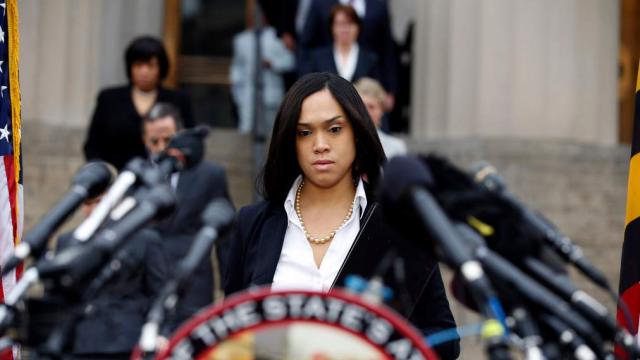
When Baltimore city state’s attorney Marilyn Mosby decided to run for her current office, she reached out to community activists, politicians and business leaders, eager to share her ideas. Almost all of them, she said, discouraged her from seeking election.
“I was told I was too inexperienced, that I couldn’t raise enough money, that my decision to run could not only disrupt but potentially destroy my husband’s political career,” she recalled during a speech on Sunday in Philadelphia.
“For me, as a young black woman, to run against an older white male incumbent, powerful, with the ability to raise close to a million dollars, the skeptics wanted to know: how could I have the audacity?”
It was a line that drew cheers from the largely female crowd of more than 500 people gathered at an National Association for the Advancement of Colored People empowerment forum, part of the organisation’s 106th annual convention.
Mosby ignored the advice and was propelled to victory. At 35, she is the youngest chief prosecutor in any major American city.
“I tell you my story not to brag or to boast,” she said. “I tell my story, I share my testimony, because I recognise that I got to where I am today not because of my own doing but because of the blood, sweat, tears and sacrifices of the audacious warrior women who have come before me, who lived their lives by example for all of us.”
Mosby was thrust into the national spotlight in April after a 25-year-old African American man, Freddie Gray, was arrested and suffered a spinal injury while being transported in a police van. He died a week later.
Residents took to the streets in protest for days afterward. Some demonstrations became violent and some protesters looted businesses and set fires. In response, the governor announced a citywide curfew and deployed the national guard to Baltimore.
After a medical examiner ruled Gray’s death a homicide, Mosby charged the six officers involved in Gray’s arrest with felonies ranging from assault to murder.
During her speech on Sunday, she shared personal stories of loss, including the shooting death of a beloved cousin when she was 14 that she said helped her turn her pain into her passion to reform the criminal justice system.
She talked about setbacks, like when she was wait-listed at every law school she’d applied to and then failed the bar exam the first time she took it. She described how others had doubted her, sometimes causing her to doubt herself.
Overcoming those hardships was an important part of her story, she said, adding that they are important parts of all stories and should be shared to inspire others.
“All too often, in our communities, when we feel we’ve obtained a level of success, we want people to see where we are and not how we got to where we are,” she said.
“But we, as women, must cast our shame, our pride, our egos aside and continue to pass on our testimonies, our tried and tested journeys, to the generations coming behind us.”
Mosby ended by telling the crowd: “Ladies, we have work to do and the time is now.”
*
MEANWHILE, Jon Swaine reports in The Guardian that Eric Garner's family has demanded criminal prosecution after a $5.9 million settlement was awarded to them for Garner's stranglehold death by police last summer:
The family of Eric Garner, whose death after being choked by a New York police officer spurred forward a nationwide protest movement, demanded on Tuesday that a $5.9 million payout from the city be followed by criminal prosecutions.
Speaking at a press conference in Manhattan, Garner’s relatives said the financial settlement would not quiet their calls for action from the federal government against those involved in his fatal arrest last July.
“Don’t congratulate us,” said Garner’s mother, Gwen Carr. “This is not a victory. The victory will come when we get justice. Then we can have a victory party.”
Garner’s daughter Erica said she would be satisfied “when we get indictments and when we get a fair trial”. She said: “This does not represent justice. We call on the Department of Justice and [attorney general] Loretta Lynch to deliver justice for my father.”
Garner, 43, died on 17 July after being placed in a chokehold during an arrest on Staten Island for allegedly illegally selling loose cigarettes. The city’s medical examiner ruled the death a homicide but a state grand jury decided not to indict Daniel Pantaleo, the police officer who placed Garner in the hold, with any crime.
Video of the arrest, recorded on the cellphone of a bystander, showed a desperate Garner telling police “I can’t breathe” – words that became a rallying cry at demonstrations around the US over the deaths of him and other unarmed African Americans such as Michael Brown, 18, who was fatally shot about three weeks later in Ferguson, Missouri.
“They treated my husband like an animal,” Esaw Garner, Eric’s widow, said on Tuesday. “They treat animals with more respect than human beings, and they need to do something about that Asap because we are losing our family members and they’re not losing anything.”
The office of the US attorney in Brooklyn is investigating Garner’s death with a view to potentially bringing federal civil rights charges against officers involved. The bar to such a prosecution is high, however, and the Justice Department has declined to proceed in other controversial cases.
Pantaleo, 30, is confined to desk duties while an internal investigation into his conduct continues. His home is guarded by police. It was reported this week that he is keen to return to frontline policing.
An attempt by media outlets and civil liberties advocates to unseal the traditionally secret transcripts of the grand jury process in Garner’s case was rejected by a judge earlier this year.
Following the news of the settlement, Letitia James, the New York City public advocate, renewed her request for the documents to be released. “We must honour the memory of Eric Garner by ensuring a lasting legacy of reform that fixes a system that has been broken for far too long,” said James.
The $5.9 million deal will prevent the formal filing by Garner’s family of a threatened $75m lawsuit against city authorities. It was struck with just days to spare before the deadline of the first anniversary of his death.
Garner’s family spoke on Tuesday morning at the Harlem headquarters of the National Action Network, the activist group led by the Rev Al Sharpton. “Money is not justice,” said Sharpton. “Money is a recognition of the loss of the family, but it does not deal with the criminal and other wrongs done to this and other families.”
Relatives may yet seek an additional payout through a separate lawsuit against emergency workers who attended the scene. They were captured on video apparently failing to give Garner treatment such as CPR or oxygen.
Mayor Bill de Blasio is scheduled to speak about Garner at an interfaith memorial service to be held on Monday evening at Mt Sinai United Christian church on Staten Island.
The mayor acknowledged in a statement that “no sum of money can make this family whole” but said he hoped their search for “peace and finality” would be aided by the settlement. “By reaching a resolution, family and other loved ones can move forward even though we know they will never forget this tragic incident,” De Blasio said in a statement.
Scott Stringer, the city comptroller, said the settlement was “in the best interests of all parties”, but noted that the city had not admitted liability for Garner’s death.
“I believe that we have reached an agreement that acknowledges the tragic nature of Mr Garner’s death while balancing my office’s fiscal responsibility to the City,” Stringer said in a statement.
The settlement was, however, sharply criticised by a major police union representing New York officers. Writing in the New York Post, Ed Mullins, the president of the Sergeants Benevolent Association, described the sum awarded to the Garners as “obscene”.
“In my view, the City has chosen to abandon its fiscal responsibility to all of its citizens and genuflect to the select few who curry favor with the city government,” said Mullins, who claimed that “although Mr Garner did not provide his family with an abundance of wealth, it was clear from the outset that the mayor’s Office would”.
3 WAYS TO SHOW YOUR SUPPORT
- Log in to post comments













Comments
Brendon Carr replied on
"Success"
Tell us more about Marilyn Mosby's "success" of which you boast.